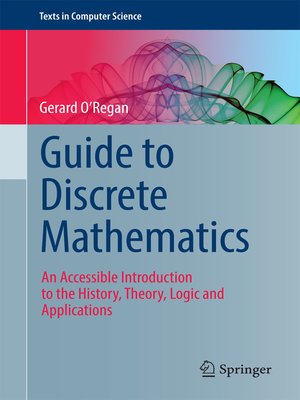Guide to Discrete Mathematics
ebook ∣ An Accessible Introduction to the History, Theory, Logic and Applications · Texts in Computer Science
By Gerard O'Regan

Sign up to save your library
With an OverDrive account, you can save your favorite libraries for at-a-glance information about availability. Find out more about OverDrive accounts.
Find this title in Libby, the library reading app by OverDrive.



Search for a digital library with this title
Title found at these libraries:
| Library Name | Distance |
|---|---|
| Loading... |
This stimulating textbook presents a broad and accessible guide to the fundamentals of discrete mathematics, highlighting how the techniques may be applied to various exciting areas in computing. The text is designed to motivate and inspire the reader, encouraging further study in this important skill.
Features: provides an introduction to the building blocks of discrete mathematics, including sets, relations and functions; describes the basics of number theory, the techniques of induction and recursion, and the applications of mathematical sequences, series, permutations, and combinations; presents the essentials of algebra; explains the fundamentals of automata theory, matrices, graph theory, cryptography, coding theory, language theory, and the concepts of computability and decidability; reviews the history of logic, discussing propositional and predicate logic, as well as advanced topics; examines the field of software engineering, describing formal methods; investigates probability and statistics.
Features: provides an introduction to the building blocks of discrete mathematics, including sets, relations and functions; describes the basics of number theory, the techniques of induction and recursion, and the applications of mathematical sequences, series, permutations, and combinations; presents the essentials of algebra; explains the fundamentals of automata theory, matrices, graph theory, cryptography, coding theory, language theory, and the concepts of computability and decidability; reviews the history of logic, discussing propositional and predicate logic, as well as advanced topics; examines the field of software engineering, describing formal methods; investigates probability and statistics.







